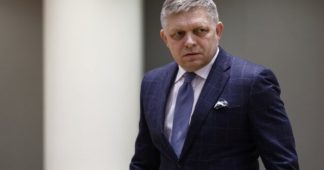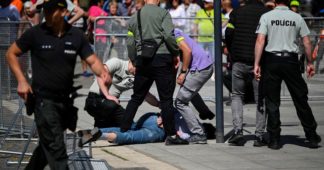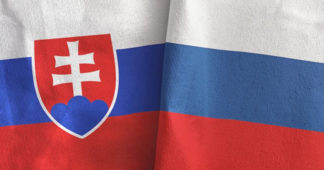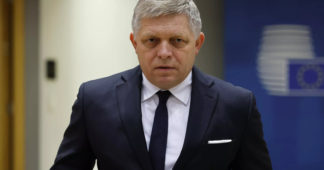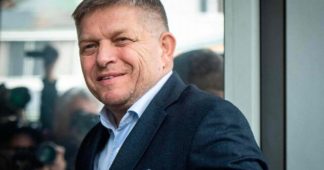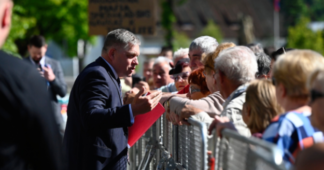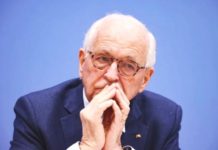Robert Fico’s first official visit to Ukraine lasted only half a day. He met with Ukrainian Prime Minister Denys Shmyhal at around 10:00 a.m. local time on January 24 in Uzhhorod, a city in western Ukraine, not far from the border with Slovakia. While the politicians agreed to “continued cooperation,” no other details about their meeting were announced. Right after dinner, Fico flew to Berlin for talks with German Chancellor Olaf Scholz.
Before the bilateral meeting in Uzhhorod took place, Fico said that “Ukraine is not a sovereign country and is under the total influence of the U.S.” and called the return of territories occupied by Russia “unrealistic.” “What are Ukrainians waiting for? For Russians to leave Donbas and Luhansk? Or Crimea? It’s not realistic. The conflict can’t be solved through military means, and prolonging it will only strengthen Russia’s positions,” said the Slovak Prime Minister in an interview with Radio and Television of Slovakia.
Fico has maintained this position since the start of Russia’s full-scale invasion in February 2022 (when he was a lawmaker in the opposition). “An immediate halt to combat operations is the best solution we have for Ukraine. The E.U. should change from an arms supplier to a peacemaker. Let them spend 10 years holding peace talks rather than 10 years killing each other with no result,” said Fico in late October 2023, one day after assuming office.
One of his first decisions as prime minister was to stop sending equipment and ammo from state and army warehouses to Ukraine’s Armed Forces. Slovakia had previously sent 13 military aid packages worth 671 million euros (around $720 million), including an S-300 air defense system, 13 MiG-29 fighter jets, Mi-171 helicopters, infantry fighting vehicles, ammunition, and anti-tank systems.
Fico has also spoken out against Ukraine’s membership in NATO and promised to block Kyiv’s potential accession. “It would be nothing but the basis for a third World War,” said Fico.
‘In Slovakia, a significant portion of the population openly sympathizes with Russia’
Robert Fico, who leads the Smer political party, adopted a harsher approach to Ukraine in mid-2022, explains Slovak political scientist Jozef Lenč from the University of Ss. Cyril and Methodius: “Around this period, Smer politicians began talking about a peaceful solution, centered on ending military support for Ukraine, and it giving up occupied and annexed territories.”
The Smer party maintains that the war in Ukraine started because of “provocations from NATO and the U.S.” and because “Ukrainian nazis” infringed upon the rights of Russian-speakers in the Donbas. Lenč explained that such statements were Fico’s way of trying to attract voters from the far-right, who tend to hold pro-Russian views. “And that’s what he succeeded in doing,” said Lenč.
Excerpt from an article published by Meduza.io
We remind our readers that publication of articles on our site does not mean that we agree with what is written. Our policy is to publish anything which we consider of interest, so as to assist our readers in forming their opinions. Sometimes we even publish articles with which we totally disagree, since we believe it is important for our readers to be informed on as wide a spectrum of views as possible.
